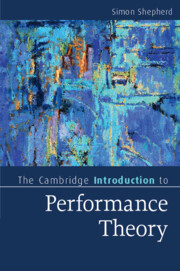Book contents
- Frontmatter
- Contents
- Preface
- Part I Definitions of performance
- Part II The emergence of performance as sensuous practice
- 6 Situationism, games and subversion
- 7 Hippies and expressive play
- 8 Performance as a new pedagogy
- 9 Architecture and the performed city
- 10 New forms of activism
- 11 Happenings and everyday performance
- 12 Body art and feminism
- 13 The arrival of Performance Art and Live Art
- 14 Dance party politics
- Part III Theorising performance
- Closing note
- References
- Index
- Cambridge Introductions to …
6 - Situationism, games and subversion
from Part II - The emergence of performance as sensuous practice
Published online by Cambridge University Press: 05 February 2016
- Frontmatter
- Contents
- Preface
- Part I Definitions of performance
- Part II The emergence of performance as sensuous practice
- 6 Situationism, games and subversion
- 7 Hippies and expressive play
- 8 Performance as a new pedagogy
- 9 Architecture and the performed city
- 10 New forms of activism
- 11 Happenings and everyday performance
- 12 Body art and feminism
- 13 The arrival of Performance Art and Live Art
- 14 Dance party politics
- Part III Theorising performance
- Closing note
- References
- Index
- Cambridge Introductions to …
Summary
Through the latter half of 1964 and on into 1965 small groups of young people would converge at midnight every Saturday at the foot of a statue in Amsterdam. The statue was that of an anonymous small boy, the Lieverdje. It was a gift to the city from a tobacco company, and, as far as the Saturday night gatherings were concerned, it was less the statue itself than these donors who were important. For this was the spot chosen by Robert Jasper Grootveld to promote his campaign against the use of tobacco. Each midnight event would consist of a speech by Grootveld followed by the burning of something. On at least one occasion it was the statue itself which went up in flames.
Provocations in Amsterdam
The events at the Lieverdje were part of a one-man campaign. It started with Grootveld defacing cigarette advertisements with the word ‘Kanker’ or the letter ‘K’. As a consequence of legal action by advertising agencies for this vandalism he was repeatedly gaoled. From this first phase of his campaign he moved on to establish an ‘Anti-Smoking Temple’. Here he
led his collaborators, primarily artists and local teenagers, in ritual performances against smoking and tobacco. Vast quantities of smoke were produced to exorcise evil spirits, with Grootveld leaping around the fires in ceremonial dress, his face painted and his spellbound audience circling the flames behind him. His tongue-in-cheek sermons ended with the anti-smoking coughing song: ‘Ugge-ugge-ugge-ugge’ … The Publicity Song followed: ‘Publicity, publicity, publicity, moooooooooore publicity’. (Kempton 2007: 25; my elision)
Then in April 1964 Grootveld launched a citywide game called Marihuette. Although this name was based on ‘marijuana’ Grootveld claimed ‘marihu’ could consist of anything that smoked – straw as well as grass, so to speak – apart from tobacco. Teun Voeten says the idea of the game ‘was to demonstrate the establishment's complete ignorance on the subject of cannabis’ (1990). Its rules were distributed by means of a chain letter (a pre-Internet mechanism of viral communication), leaving receivers able to add to the rules as they wished. As part of the game Grootveld filled cigarette packets with marihu, of any burnable sort, and smuggled the packets into vending machines. The rules themselves, characteristically of this sort of game, were fairly inscrutable, largely having to do with getting numbers of points in relation to being arrested, rather than avoiding arrest, for marijuana usage.
- Type
- Chapter
- Information
- The Cambridge Introduction to Performance Theory , pp. 57 - 67Publisher: Cambridge University PressPrint publication year: 2016



